
Jesus Loves Religious People, Too
By Luke Stamps
Jesus is a friend of sinners. It is a glorious gospel truth that Jesus befriends those who are entangled in sinful and complicated circumstances and loves them even when ostensibly religious people do not. We see this countercultural acceptance of sinners throughout the Gospel accounts, as Jesus extends divine forgiveness to tax collectors and “sinners,” embraces and reverses the uncleanness of the leprous and demonic, and even dares to enjoy table fellowship with prodigals and prostitutes, whose lawlessness was viewed by the religious people of the day as an impediment to God’s coming kingdom.
By contrast, Jesus reserves his harshest words of judgment for religious people, the scribes and Pharisees, in particular. He describes them as white washed tombs—respectable and presentable on the outside but filled with stinking corpses on the inside (Matt 23:27). He calls them a “brood of vipers,” thus identifying them with Satan himself and warning them of the judgment of hell (Matt 23:33). Ironically, Jesus warns religious people of the severest forms of eschatological judgment.
And yet, Jesus still shows compassion to the chronically religious. After pronouncing woe after woe upon the scribes and Pharisees, Jesus can still speak words of tenderness and mercy on their behalf: “O Jerusalem, Jerusalem, the city that kills the prophets and stones those who are sent to it! How often would I have gathered your children together as a hen gathers her brood under her wings, and you would not!” (Matt 23:27). And in one of his most striking parables, Jesus holds out hope that even self-righteous Pharisees might repent and enter the kingdom of God.
In the parable of the two sons, Jesus describes two responses to a father’s call to work in his vineyard.
What do you think? A man had two sons. And he went to the first and said, ‘Son, go and work in the vineyard today.’ And he answered, ‘I will not,’ but afterward he changed his mind and went. And he went to the other son and said the same. And he answered, ‘I go, sir,’ but did not go. Which of the two did the will of his father?” They said, “The first.” Jesus said to them, “Truly, I say to you, the tax collectors and the prostitutes go into the kingdom of God before you (Matt 21:28-31).
At first blush, the two sons in the parable seem to parallel exactly the two groups whom Jesus is addressing. The first son would seem to represent the tax collectors and prostitutes and the second son the scribes and Pharisees. To be sure, this does seem to be the basic application Jesus is drawing from the parable. Even though the tax collectors and sinners started out in rebellion, they repented and obeyed the call of Christ. And conversely, the scribes and Pharisees might claim to be obeying God, but their rejection of Jesus contradicts this claim.
But Jesus then adds an interesting twist in his application of the story: “For John came to you in the way of righteousness, and you did not believe him, but the tax collectors and the prostitutes believed him. And even when you saw it, you did not afterward change your minds and believe him” (Matt 21:32, emphasis added). Notice the repetition of the language of repentance: “afterward change your minds.” This was the exact same language applied to the first son in the parable. So, it seems that Jesus is placing the scribes and Pharisees into the category of the first son, at least potentially. In other words, Jesus still holds out to them the invitation to repent and enter the kingdom of God. Their rejection of John and his message doesn’t have to be final. There is still space for repentance, even for religious people.
Think about how much time Jesus spent dialoging with the religious leaders of his day. Yes, he rebuked them, but he didn’t ignore them. Nor did he needlessly provoke them. He warned them in the strongest of terms, but he also befriended them (see his meal with Simon the Pharisee in Luke 7:36-49) and counted some of them among his disciples (Nicodemus and Joseph). To be clear, Jesus did not leave religious people in their self-righteousness and judgmentalism, any more than he left tax collectors in their extortion or prostitutes in their immorality. His call to “go and sin no more” was equally applicable to the religious as to the irreligious. But the invitation was still mercifully extended to all.
One cannot read the Gospels without getting a sense of Jesus’ compassion for all kinds of people. That is good news for recovering prostitutes and recovering Pharisees alike. Jesus is a friend of sinners, it is true. But he is also a friend to people who often struggle to see and repent of their sin. After all, Jesus loves religious people, too.
Luke Stamps is a Ph.D. candidate at The Southern Baptist Theological Seminary in systematic theology. Luke is a weekly contributor to the Credo blog and also blogs at Before All Things. Luke is married to Josie, and they have three children, Jack, Claire, and Henry. Luke is a member of Clifton Baptist Church in Louisville, KY.

